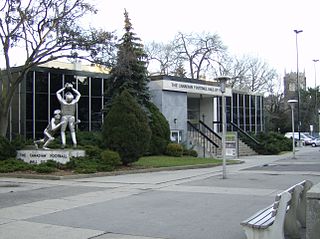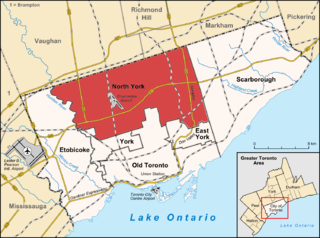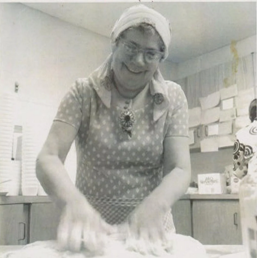Related Research Articles

Events from the year 1930 in Canada.

The Canadian Football Hall of Fame (CFHOF) is a not-for-profit corporation, located in Hamilton, Ontario, that celebrates achievements in Canadian football. It is maintained by the Canadian Football League (CFL). It includes displays about the CFL, Canadian university football and Canadian junior football history.

North York is a former township and city and is now one of the six administrative districts of Toronto, Ontario, Canada. It is located in the northern area of Toronto, centred around Yonge Street, north of Ontario Highway 401. It is bounded by York Region to the north at Steeles Avenue, on the west by the Humber River, on the east by Victoria Park Avenue. Its southern boundary is erratic and corresponds to the northern boundaries of the former municipalities of Toronto: York, Old Toronto and East York. As of the 2016 Census, the district has a population of 644,685.
The Canadian Union of Fascists was a fascist political party based in the city of Toronto in the 1930s with its western Canadian office in Regina, Saskatchewan.

Platinum Blonde, known briefly as The Blondes, is a Canadian rock band that formed in Toronto, Ontario in 1979. Vocalist Mark Holmes has been the only consistent member of the band since its inception.

The Sun Dance is a ceremony practiced by some Native Americans in the United States and Indigenous peoples in Canada, primarily those of the Plains cultures. It usually involves the community gathering together to pray for healing. Individuals make personal sacrifices on behalf of the community.
Charles Brandle Crate was a Canadian fascist who was the leader of the Canadian Union of Fascists.

The Stone Angel is a novel by Canadian writer Margaret Laurence. First published in 1964 by McClelland and Stewart, it is perhaps the best-known of Laurence's series of five novels set in the fictitious town of Manawaka, Manitoba. In parallel narratives set in the past and the present-day, The Stone Angel tells the story of Hagar Currie Shipley. In the present, 90-year-old Hagar struggles against being put in a nursing home, which she sees as a symbol of death. This narrative alternates with Hagar looking back at her life.

Where the Spirit Lives is a 1989 television film about Aboriginal children in Canada being taken from their tribes to attend residential schools for assimilation into majority culture. Written by Keith Ross Leckie and directed by Bruce Pittman, it aired on CBC Television on October 29, 1989. It was also shown in the United States on PBS on June 6, 1990, as part of the American Playhouse series and was screened at multiple film festivals in Canada and the United States.

Margarette Rae Morrison Luckock known as Rae Luckock was a feminist, social justice activist, peace activist and, with Agnes Macphail, one of the first two women elected to the Legislative Assembly of Ontario, in 1943. A member of the Co-operative Commonwealth Federation, also known as the Ontario CCF, Luckock was elected to the Ontario legislature in the 1943 Ontario general election representing Toronto's Bracondale constituency (riding). She served as a Member of Provincial Parliament (MPP) until she was defeated in the 1945 Ontario general election. She became the Congress of Canadian Women's founding president in 1950 and became a victim of the Cold War's anti-communist hysteria when she was denied entry into the United States, because she travelled to "Red" China and invited Soviet women to visit Canada. She contracted Parkinson's disease in the mid-1950s and mostly was bedridden until her death in 1972.
Betty Jane Wylie, is a Canadian writer and playwright.
Walter Perry Deiter was a Canadian First Nations leader. He was the founding chief of the National Indian Brotherhood in 1968, which is today known as the Assembly of First Nations.

Rebecca Belmore D.F.A. is a Canadian interdisciplinary Anishinaabekwe artist who is notable for politically conscious and socially aware performance and installation work. She is Ojibwe and a member of Obishikokaang. Belmore currently lives in Toronto, Ontario.
John Wesley Ackroyd was a prominent Canadian Chief of Police and high level Ontario civil servant. He served as the chief of the Metro Toronto Police Force from 1980 to 1984. Known as an ideas man, and 'kind cop' he introduced community policing when he was the deputy chief. Though later, during his term as the chief, the biggest mass civilian arrest since the Second World War occurred in Toronto's Gay district. Following his retirement from the police force, he was head of the Liquor Control Board of Ontario from 1984 to 1990, where he modernized the retail operations and its marketing.
Eleeshushe Parr was an Inuk graphic artist and sculptor, from the Kingnait area, who produced over 1,160 drawings. Her work has been exhibited in Canada, the United States, and Sweden.
The Native Canadian Centre of Toronto, founded in 1962, is a membership based charity organization that provides social, recreational, cultural, and spiritual services to Indigenous people in Toronto.
Walter Robert Hickling was a Canadian artist, poet, composer and educator. Hickling was a graduate of the Ontario College of Art, an active member of local and regional art clubs, and a founding member of Hamilton Artists Inc.

Lynn Gehl is an Algonquin Anishinaabe-kwe from the Ottawa River Valley, Ontario, Canada. She is a writer, blogger and Indigenous human rights advocate. Gehl was involved in legal challenges aimed at eliminating the continued sex discrimination in the Indian Act. She is also an outspoken critic of the contemporary land claims and self-government process, as well as Indigenous issues in Canada. In April 2017, Gehl was successful in defeating Indian and Northern Affairs Canada’s unstated paternity policy when the Court of Appeal for Ontario ruled the sex discrimination in the policy was unreasonable.

Verna Patronella Johnston (1909-1996) was an Ojibway and Potawatomi (Anishinaabe) author, mother, grandmother, mentor, and community activist, known for helping Indigenous youth who had travelled to the city of Toronto for secondary and post-secondary educational opportunities from the 1960s through to the 1980s. She became an important leader within the urban Indigenous community in the city.
References
- 1 2 3 4 5 6 Mccardle, Bennett (2008-01-30). "Walter Currie | The Canadian Encyclopedia". www.thecanadianencyclopedia.ca. Retrieved 2019-12-31.
- ↑ Elias, Peter Douglas. (1991). Development of aboriginal people's communities. North York, Ont., Canada: Captus Press. pp. 4. ISBN 0-921801-51-3. OCLC 26014487.
- ↑ Jarvis, Ann (1991-10-21). "Black, Indian plights compared as church marks its 150th year". Windsor Star. p. A5 – via ProQuest.
- 1 2 3 Catto, Helen (1967-07-06). "History of 3 Interracial Marriages: Eloping meant no chance of a scene". The Globe & Mail. p. W1 – via ProQuest.
- 1 2 "TV blasted, blessed at welfare council meet". Toronto Daily Star. 1965-07-05. p. 36 – via ProQuest.
- ↑ "This Indian always played the cowboy: He hated losing". Toronto Daily Star. 1966-01-13. p. B33 – via ProQuest.
- ↑ Sangster, Joan (2017). "Presidential Address Confronting Our Colonial Past: Reassessing Political Alliances over Canada's Twentieth Century". Journal of the CHA. 28: 19.
- 1 2 "Beware 'Red Power,' Indian riots: Sociologist". Toronto Daily Star. 1968-09-26. p. 9 – via ProQuest.
- ↑ "Indians 'forced to break law'". Toronto Daily Star. 1967-07-08. p. 5 – via ProQuest.
- ↑ McDuff, Gerald (1969-11-11). "Indians, Eskimos want aid from CBC". Toronto Daily Star. p. 8 – via ProQuest.
- ↑ Schiff, Martin (1965-07-05). "Idiot's Machine or Educational? Split Over TV". The Globe & Mail. p. 17 – via ProQuest.
- ↑ Canada, Indian-Eskimo Association of. Indian-Eskimo Association of Canada fonds (1957-1970).
- ↑ McCue, Harvey (2011). "He Walked in Our Moccasins and Mukluks: Tom Symons and Native and Northern Studies and Policy". Tom Symons: A Canadian Life: 73–88. doi:10.2307/j.ctv16sh3.7.
- ↑ Rogers, Edward S.; Smith, Donald B. (1994). Aboriginal Ontario : historical perspectives on the First Nations . Toronto [Ont.]: Dundurn Press. ISBN 978-1-55488-063-8. OCLC 244771106.
- ↑ Taner, Shona (1999). "The Evolution of Native Studies in Canada: Descending from the Ivory Tower" (PDF). Canadian Journal of Native Studies. XIX: 289–319.
- ↑ "Indian reserves called 'time-bomb' White schooling blamed". Toronto Daily Star. 1971-08-27. p. 1 – via ProQuest.
- ↑ McCabe, Nora (1972-01-04). "'Return Indian heritage,' whites told". Toronto Daily Star. p. 24 – via ProQuest.
- ↑ Henton, Darcy (1990-07-01). "Native Business Can Work: Indian leasers say governments must change the rules they use to fund enterprise if Canada's natives are to benefit". Toronto Star. p. F1, F4 – via ProQuest.
- ↑ Cleroux, Richard (1983-09-20). "Complaints force Regina to leash city police dogs". The Globe & Mail. p. 9 – via ProQuest.
- ↑ "Regina police face feat over canines". The Globe and Mail. 1984-02-25. p. 14 – via ProQuest.
- ↑ Strauss, Marina (1983-06-11). "Rights groups want Regina police to stop using dogs". The Globe and Mail. p. P5 – via ProQuest.
- ↑ "Mr. Walter Currie - Obituaries - Chatham, ON - Your Life Moments". www.yourlifemoments.ca. Retrieved 2019-12-31.
- ↑ Faris, Donald L; Currie, Walter; Regina Board of Police Commissioners (1983). Review of the Regina Police Service Canine Unit. Regina, Sask.: Regina Board of Police Commissioners. OCLC 317625446.
- ↑ Currie, Walter; Mid-Canada Development Corridor Conference, eds. (1971). Urbanization of Indians; address by W. Currie ... to Mid-Canada Development Corridor Conference [at] Lakehead University, Aug. 20, 1969. Toronto, Ont.: Indian-Eskimo Association of Canada. OCLC 39012626.
- ↑ Deiter, Walter; Currie, Walter (1970). Presentation to Senate Committee on Poverty. Winnipeg, Manitoba: National Indian Brotherhood of Canada. OCLC 54172296.
- ↑ Currie, Walter (1968). "Is the Canadian Indian Act "Legislated Discriminaiton"?". Human Relations. 8 (16): 10–12. OCLC 462017706.
- ↑ Currie, Walter (1967). The native Canadian and legislated discrimination: an address by Walter Currie to the Progressive Conservative Centennial Policy Conference, Maison Montmorency, Couville, P.Q., August 6-10, 1967. Toronto: Indian-Eskimo Association of Canada. OCLC 24813344.
- ↑ Currie, Walter; Indians and the City Conference, eds. (1970). Indians and the city: address [delivered at the] "Indians and the City" Conference, Winnipeg, Man., October 1966. Toronto: Indian-Eskimo Association of Canada. OCLC 877118752.
- ↑ Currie, Walter (1966). Indians and the city. OCLC 606446783.
- ↑ Currie, Walter (1970). Indians and the city : A project of the Indian-Eskimo Association of Canada in cooperation with the Department of Indian Affairs and Northern Development. Toronto: Indian-Eskimo Association of Canada.